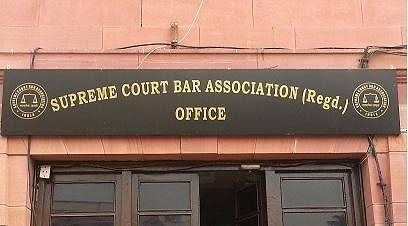Over 100 practicing lawyers and members of the Supreme Court Bar Association (SCBA) have filed an intervention application seeking complete physical hearing. The IA has been filed in the pending petition of All India Association of Jurists (AIAJ) writ petition.
The bench of Justice L. Nageswara Rao, Justice B.R. Gavai and Justice B.V. Nagarathna issued notice in the matter and agreed to hear the matter on December 6, 2021 along with other matters.
The 114 SCBA lawyers have filed the intervention application petition in the hearing of an AIAJ petition challenging the Uttarakhand High Court’s decision to completely implement physical hearing.
Today, during the demand for early hearing in the matter, the court said that your bar on this matter is also divided into two parts.
According to the petition, the cases should be heard in the open court in front of parties, but under the guise of the epidemic, some people are opposing physical hearing.
According to the petition, many lawyers are not able to easily keep themselves in the hearing from the VC when there are technical problems in the VC. Many problems have to be faced during the hearing due to technical problems.
Also Read: The Doon Dilemma
Relief prayed in the intervention application are as follows:
- Issue directions for resumption of normal physical hearing as was prevalent prior to March 16, 2020 and,
- Issue ad-interim direction for commencement of physical hearing on Monday and Friday (being miscellaneous day ) as well as Tuesday considered (NMD)
The applicants submitted three reasons as to why Open justice is important.
First, it assists in the search of search for truth and played an important role in informing and educating the public. Secondly, it enhanced accountability and deterred misconduct. And thirdly, it had a therapeutic function offering an assurance that justice had been done.There are other factors which sometimes must be balanced against the need for open justice especially in criminal matters and family matters.
The SCBA lawyers submitted,
“This honourable court understands the above facets and is determined to revert back to normal open court hearing but these motivated petitions is nothing but a sinister act to scuttle it. The honourable Apex Court is going back to physical functioning because it understands the fact that in India, still a sizeable section of lawyers do not have good internet connectivity or the technical know-how of accessing devices. The courts have tried their best to train lawyers to adapt to the new technology, but the virtual court set-up still carries lot many problems for the lawyers belonging to the lower rung of the society for the same reasons, well paid senior advocates want to stay online, but the majority want to revert to physical hearing.”
The applicants also highlighted the disadvantages of virtual courts by submitting,
“The disadvantage of virtual courts also percolate to the junior members and the very senior members of the bar. They do lose out heavily on the practical observations of watching senior voicing their arguments and court craft skills . In addition, the conduct of the court by the judge would also be an important observation for the junior members of the bar code. All in all there is no substitute for practical learnings of the profession which is not feasible through video conferencing.”
“Traditionally the administration of justice requires hearing the cases and complaints of the litigants through their legal representatives/advocates and by the Judges in open courts. Open Courts refer to proceedings conducted before a Court of law in full public view,”
-the application states further.


